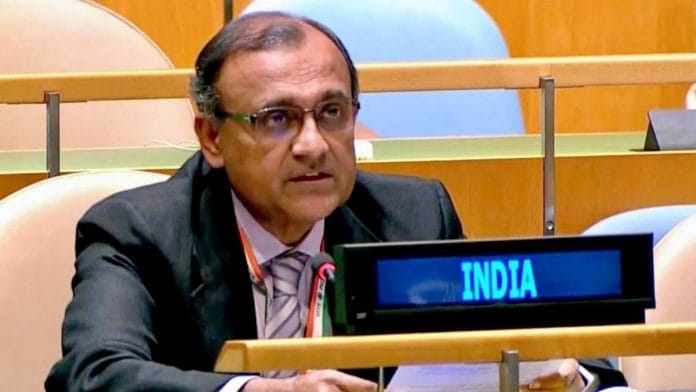New Delhi: In a move symbolic of the changing and democratic nature of communications at the United Nations, the 76th session of the United Nations General Assembly (UNGA) adopted an India-sponsored resolution on multilingualism Friday.
The resolution promoted the UN’s Department of Global Communications to use both official and non-official languages, including Bangla, Hindi, and Urdu, in its communications. It also mentioned languages like Portuguese, Kiswahili, and Persian.
While the UN has six official languages — English, Russian, Spanish, Chinese, Arabic and French — the addition of Hindi, Bangla, and Urdu will instrumentalise and institutionalise their usage as mediums for disseminating UN information, said T.S. Tirumurti, India’s Permanent Representative to the UN in New York.
The resolution was co-facilitated by Andorra and Columbia.
Alluding to the significance of the resolution, Tirumurti said, “Multilingualism is recognised as a core value of the UN. We also thank the Secretary-General (UN Secretary-General António Guterres) for prioritising multilingualism”.
Ambassador Tirumurti added that India welcomed the first time mention of Hindi, Bangla, and Urdu as languages for communicating important information and messages of the UN.
?Watch: @ambtstirumurti, Permanent Representative deliver his remarks during consideration of the draft resolution on multilingualism co-sponsored by India ⤵️@MEAIndia pic.twitter.com/vUcmjnM99R
— India at UN, NY (@IndiaUNNewYork) June 10, 2022
Explaining the significance of the move, Kanwal Sibal, a former Indian foreign secretary said, “The resolution is of importance and provides long due recognition to Hindi, specifically given the numbers that speak the language around the world.
ThePrint decodes the details of the resolution and what it means for India.
Also read: Nehru going to UN on Kashmir was an error. And he knew it
Multilingualism enabler of multilateral diplomacy
Democratising language at the UN through multilingualism remains an essential objective of the UNGA. The draft of the resolution adds that multilingualism is a core facet of Article 1 of the Charter of the UN, which states the purpose of the United Nations.
Further explaining the import of multilingualism in UN communications, the draft adds that “multilingualism is an enabler of multilateral diplomacy and that it contributes to the promotion of the values of the United Nations”.
The first-time mention of Hindi, Bangla and Urdu will also help in “promoting, protecting and preserving diversity of languages and cultures globally, as well as of improving the efficiency, performance and transparency of the Organization”, noted the draft of the resolution.
Specifically, the aim of the resolution is not to substitute the usage of the official languages with the newly added languages. Instead, the purpose is to “encourage the Department of Global Communications to continue to use other languages in addition to the official languages, when appropriate, according to the targeted audience, with a view to reaching the widest possible spectrum of audiences and extending the United Nations message to all corners of the world in order to strengthen international support for the activities of the Organization”, it added.
The multilingual resolution also called for strict observance of the newly formed language arrangements by the different bodies and organs of the United Nations.
India partnering with UN Global Communications since 2018
Addressing the UNGA, Tirumurti spoke of India’s efforts to promote its languages at the UN, “India has been partnering with the UN Department of Global Communications since 2018 by providing an extra-budgetary contribution to mainstream and consolidate news and multimedia content in the Hindi language.”
Further, he added, “’Hindi @ UN’ project was launched in 2018 with an objective to enhance the public outreach of the United Nations in the Hindi language, and to spread greater awareness about global issues among millions of Hindi-speaking populations around the world”.
Tirumurti concluded by reiterating India’s support to further push and enhance multilingualism at the UN, and globally.
While the UN’s adoption of the multiculturalism resolution is no doubt encouraging, “the real issue”, as Sibal pointed out, “will revolve around finding the funding for translators and writers to ensure that the new forms of communication are disseminated in these languages”.
(Edited by Poulomi Banerjee)
Also read: China expanding influence in UN via increased funding, placing key officials: Think-tank study






